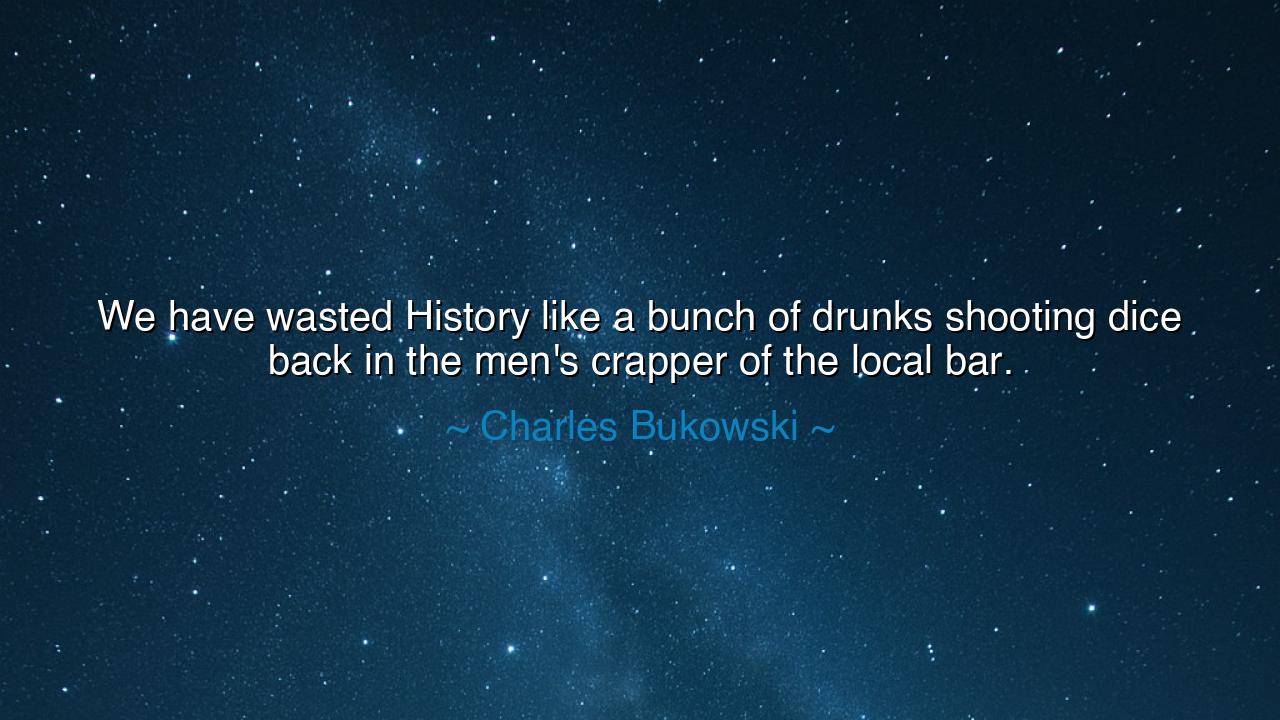
We have wasted History like a bunch of drunks shooting dice back
We have wasted History like a bunch of drunks shooting dice back in the men's crapper of the local bar.






The poet of the streets, Charles Bukowski, who wrote with whiskey in his veins and truth in his breath, once spat out these brutal and brilliant words: “We have wasted History like a bunch of drunks shooting dice back in the men’s crapper of the local bar.” In this vulgar yet prophetic image, Bukowski captures the tragedy of modern civilization — that humankind, blessed with the wisdom of ages, squanders its inheritance in foolishness and greed. His voice, raw and unapologetic, rises not as that of a preacher, but of a prophet — a man disillusioned with a species that has forgotten the sacred weight of its own History.
To understand the origin and power of this quote, one must first understand Bukowski himself. He was not a philosopher in marble halls, nor a scholar of the academies. He was a man of the gutter, a poet of the everyday, who saw the truth of human nature not in theories but in the smoke of cheap bars and the eyes of broken men. He lived among the lost, and in their laughter and despair he saw a reflection of all humanity. When he said we have “wasted History,” he meant that the blood, wisdom, and struggle of countless generations have been reduced to games of chance — that instead of learning from our past, we gamble it away in ignorance, arrogance, and apathy.
Think of what History truly is: the long and painful journey of humankind toward understanding, the accumulation of sacrifice, the memory of triumph and disaster. It is the wisdom written in ruins, the cry of civilizations that rose and fell because they forgot the lessons of those before them. Bukowski’s metaphor — of men shooting dice in a filthy restroom — is a condemnation of how lightly we treat this sacred inheritance. Instead of reverence, we show carelessness. Instead of reflection, we seek distraction. He paints us as gamblers of destiny, squandering the fortunes handed down by the dead, our hands stained not with ink or thought, but with the waste of our indifference.
History is filled with examples of such folly. Consider Rome, that empire of marble and might, which once seemed eternal. Its people, drunk on conquest and comfort, forgot the virtues that had built their greatness — discipline, unity, and duty. They became spectators rather than citizens, chasing pleasure as their world decayed around them. Bread and circuses replaced wisdom and purpose, until at last the empire crumbled. This is the image Bukowski evokes: the heirs of greatness playing dice in the ruins of their inheritance, too intoxicated by the moment to see that their world is collapsing. The lesson of Rome was written in stone — yet humanity, century after century, ignores it.
But Bukowski’s words are not only about nations; they speak to the soul of the individual. Each of us carries a personal history — a treasury of experience, of pain and learning — and yet, how often do we waste it? How often do we repeat our mistakes, ignore our growth, and chase fleeting pleasures instead of meaning? We, too, are the drunks in his metaphor, rolling dice with our lives, throwing away the lessons that could save us. Bukowski’s scorn is not only for governments and generals, but for every human heart that forgets its own story, that refuses to honor the wisdom bought through suffering.
And yet, beneath his bitterness, there is a plea — a cry for awakening. Bukowski, in his rough and unrefined way, asks us to remember. To look upon our history — both collective and personal — not as a relic, but as a living teacher. For if we would pause in our endless gambling and listen to the past, we might learn how to walk more wisely through the future. We might see that every empire, every soul that wasted its chance, did so because it forgot to value what time and toil had given it. History, to Bukowski, is not dead parchment — it is a mirror, reflecting what we are and warning what we may become.
So let this be the lesson: do not waste your history. Do not treat the struggles of those before you — nor your own past trials — as meaningless dice in a game of chance. Learn from them. Cherish them. Let them shape your choices. For every wound you carry, every failure you survive, every truth your ancestors fought to preserve — these are the gold coins of your inheritance. To spend them carelessly is to betray not only them, but yourself.
Therefore, my children of this restless age, remember Bukowski’s warning. The taverns of time are filled with the echoes of fools who gambled their future for momentary thrill. Do not join their game. Step away from the table, look upon the ruins, and learn. For if we cease to treat History as a gamble and begin to treat it as a guide, we may yet find redemption. But if we continue as we are — drunk on ignorance, deaf to the lessons of the past — we will indeed waste it all, as Bukowski said: in the filth of our own forgetfulness.






AAdministratorAdministrator
Welcome, honored guests. Please leave a comment, we will respond soon